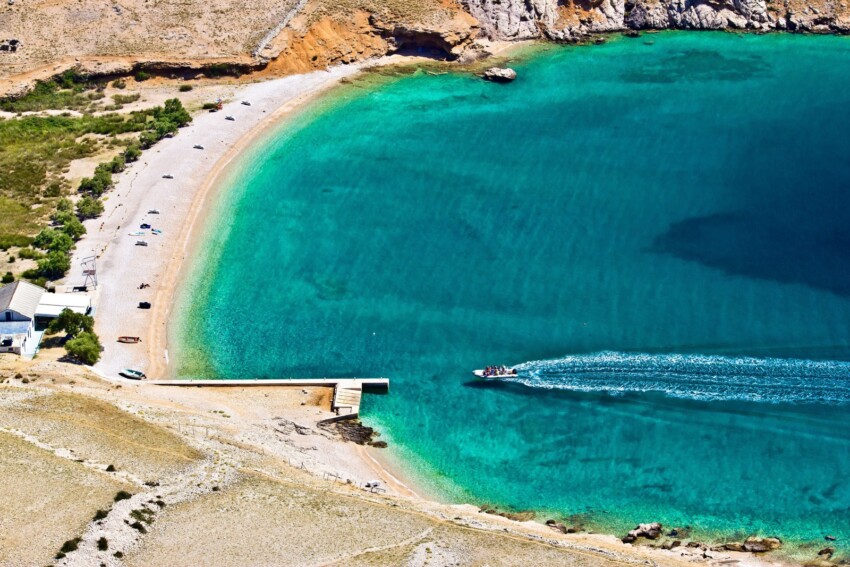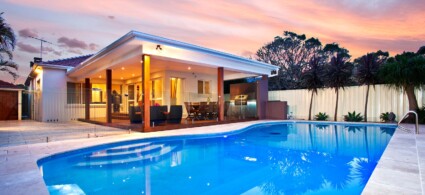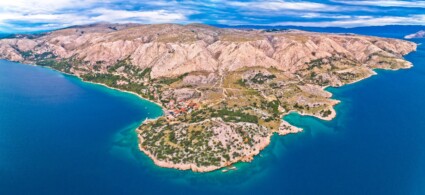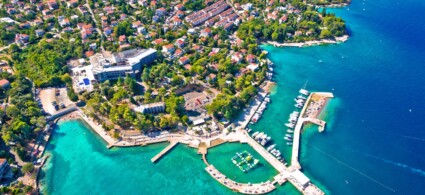

Connected to the mainland by a bridge, theisland of Krk is the largest and busiest of the Croatian islands thanks to its ease of access and its wide range of hotels, rooms to rent and campsites.
The excellent infrastructure on the island is due to a tourist industry with a decades-long tradition, which has managed to make what is certainly not the most remote of Croatian islands, and perhaps not even the most beautiful, competitive. For the quality of services and cleanliness of the water, Krk’s beaches have earned the Blue Flag.
The main villages are located in the south of the island, which has a milder climate and more lush vegetation; the north is mostly rocky and, especially in winter, very windy.

The island’s main village is located on the west coast, more or less in the centre, making it an ideal base for exploring the island.
Nestled in the Krčki Bay, Krk is a medieval town with a pretty old centre, where you can admire a 15th century castle, a Romanesque cathedral built on the remains of a 5th century Romanesque basilica and city walls.
Lovers of history and art can visit the Galeria Fortis, which exhibits a collection of amphorae, pottery and utensils from the Roman era, or the Decumanus Art Gallery for a taste of contemporary Croatian art.

Baška is the second most important town on the island and many prefer it to the town of Krk because of its beautiful natural setting. Situated at the southern end of the island, it has a long pebble beach stretching out at the foot of a high ridge.
The town is also an excellent base for hikes in the surrounding area, with trails winding through the southern part of the island.
One of the most popular is the 8-kilometre trail that leads from the Zablaće campsite to the village of Stara Baška; if you want to walk a little less, you can reach the Church of St Lucia and enjoy the view from there.
Read moreLess picturesque than Krk and Baška, the village of Punat, the island’s third tourist resort, is nonetheless a good base for exploring the island with its wide choice of accommodation and marina.
A 20-minute sea crossing from Punat takes you by water taxi to the islet of Košliun, where you can visit a 16th-century Franciscan monastery, built on an earlier Benedictine abbey.

Perched on a 48-metre cliff overlooking the sea, Vrbnik is one of the most picturesque medieval villages on the island, full of picturesque views, steep streets and arched passageways.
Peaceful, languid and quiet, this village is ideal for a slow-paced holiday of strolling through the alleyways, admiring the view, sampling the excellent local cuisine and swimming.

Although the villages are pretty, it is the beaches that are the real tourist attraction of the island of Krk. Almost all of them are gravel and pebbles, but you can also find sandy beaches, rocks and cemented platforms.
Here are the beaches not to be missed:
Discover Krk’s most beautiful beaches
One of the best ways to explore the island of Krk is to see it from the sea by taking part in one of the many boat excursions that are organised by local tour operators.
You can take part in a boat tour with the fishermen, helping out with the fishing activities yourself and then enjoying a lunch of the fish you have caught, or take a relaxing trip on a transparent-bottomed boat to admire the fish and seabed.
Boat trips to nearby islands and diving excursions around the island are also organised. Divers can admire red corals, an underwater cave and the wreck of a Greek merchant ship.
There are many options for sleeping on Krk, not least because the island is quite large and has numerous towns, villages and towns. As is usual in Croatia, it is private flats that dominate. The accommodation here is mostly private holiday homes , which locals rent out to holidaymakers during the summer months. There is no shortage of hotels, but they are far fewer in number.
To decide which town to stay in on Krk, you need to understand the type of holiday you have in mind. Just to fix your mind, the island is criss-crossed by a main road, the D102, almost 45 kilometres long, running north-south through the main towns. The first one you come across to the north is Omišalj , which is very convenient both because it is very close to the airport (it should be made clear that the airport on the island of Krk is actually Rijeka Airport!) and because it is very close to the mainland, making it an ideal port of call for those who decide to visit Krk by car from mainland Croatia.
Descending southwards is Njivice, a quiet coastal town, and shortly afterwards the large agglomeration of Porat-Vantacici-Malinska, where there is no shortage of places to stay. On the south coast, more or less halfway along Route 102, is Krk town. It is by far the largest town on the island, with over 6200 residents, and here the choice of accommodation options is vast.
Punat, overlooking its bay that almost closes to form a lake, is also interesting: here there are some excellent hotels, making it ideal for those seeking the utmost comfort. Finally, at the southern end is the town of Baška: its very long beach makes it the best place to sleep on Krk for those looking for a comfortable place to spend pleasant days by the sea.
The island of Krk is very active culturally, and there are numerous open-air music, theatre and dance festivals in the summer, as well as various sports events and traditional island festivals.
To give just a few examples: you can listen to great international musicians perform at the Baška International Guitar Festival, watch fishermen in striped jerseys parade and compete on Fishermen’s Day, cheer on the intrepid participants of the historic sea-swimming marathon that has been taking place since 1910, marvel at the oddities of the Black Sheep Festival or join dozens of walkers, runners and cyclists for the Baška Outdoor Festival.

The island ofKrk can be reached by car or bus thanks to the bridge connecting it with the mainland, which you will reach by driving south along the A7 and the D102. From Trieste to Krk is about a two-hour drive.
Buses to Krk leave from Rijeka and stop at all the towns on the island. It is not possible to get there by train.
Krk is part of the Quarnerine archipelago, and is the northernmost island in Croatia; until 2004, it was estimated to be the largest island in the Adriatic, a title later awarded to neighbouring Cres. It is part of the Primorsko-Goranska County, or Primorsko-Goranska županija in Croatian, and lies just south of Rijeka, or Rijeka, the most important city in the region ofIstria. It is connected to the mainland settlement of Crisnjeva by a bridge, Krčki Most. For the entire east coast, therefore, Krk is flanked by mainland Croatia, while much of the west coast runs parallel to the east coast of theisland of Cres.






